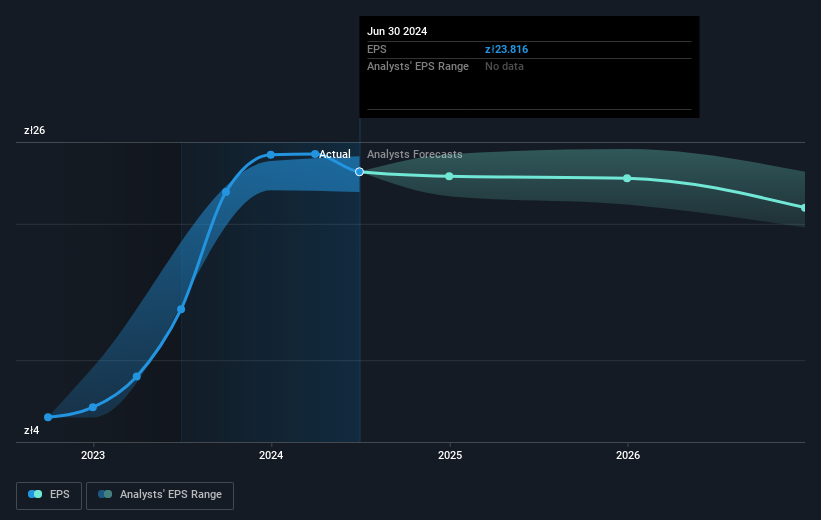Bank Polska Kasa Opieki (WSE:PEO) shareholders YoY returns are lagging the company's 73% one-year earnings growth

It hasn't been the best quarter for Bank Polska Kasa Opieki S.A. (WSE:PEO) shareholders, since the share price has fallen 15% in that time. While that might be a setback, it doesn't negate the nice returns received over the last twelve months. Looking at the full year, the company has easily bested an index fund by gaining 42%.
Although Bank Polska Kasa Opieki has shed zł1.8b from its market cap this week, let's take a look at its longer term fundamental trends and see if they've driven returns.
See our latest analysis for Bank Polska Kasa Opieki
There is no denying that markets are sometimes efficient, but prices do not always reflect underlying business performance. One way to examine how market sentiment has changed over time is to look at the interaction between a company's share price and its earnings per share (EPS).
During the last year Bank Polska Kasa Opieki grew its earnings per share (EPS) by 73%. This EPS growth is significantly higher than the 42% increase in the share price. Therefore, it seems the market isn't as excited about Bank Polska Kasa Opieki as it was before. This could be an opportunity. The caution is also evident in the lowish P/E ratio of 6.02.
The graphic below depicts how EPS has changed over time (unveil the exact values by clicking on the image).

It is of course excellent to see how Bank Polska Kasa Opieki has grown profits over the years, but the future is more important for shareholders. It might be well worthwhile taking a look at our free report on how its financial position has changed over time.
What About Dividends?
When looking at investment returns, it is important to consider the difference between total shareholder return (TSR) and share price return. The TSR is a return calculation that accounts for the value of cash dividends (assuming that any dividend received was reinvested) and the calculated value of any discounted capital raisings and spin-offs. So for companies that pay a generous dividend, the TSR is often a lot higher than the share price return. In the case of Bank Polska Kasa Opieki, it has a TSR of 58% for the last 1 year. That exceeds its share price return that we previously mentioned. The dividends paid by the company have thusly boosted the total shareholder return.
A Different Perspective
It's nice to see that Bank Polska Kasa Opieki shareholders have received a total shareholder return of 58% over the last year. That's including the dividend. That's better than the annualised return of 12% over half a decade, implying that the company is doing better recently. Given the share price momentum remains strong, it might be worth taking a closer look at the stock, lest you miss an opportunity. It's always interesting to track share price performance over the longer term. But to understand Bank Polska Kasa Opieki better, we need to consider many other factors. Even so, be aware that Bank Polska Kasa Opieki is showing 2 warning signs in our investment analysis , and 1 of those is concerning...
But note: Bank Polska Kasa Opieki may not be the best stock to buy. So take a peek at this free list of interesting companies with past earnings growth (and further growth forecast).
Please note, the market returns quoted in this article reflect the market weighted average returns of stocks that currently trade on Polish exchanges.
Valuation is complex, but we're here to simplify it.
Discover if Bank Polska Kasa Opieki might be undervalued or overvalued with our detailed analysis, featuring fair value estimates, potential risks, dividends, insider trades, and its financial condition.
Access Free AnalysisHave feedback on this article? Concerned about the content? Get in touch with us directly. Alternatively, email editorial-team (at) simplywallst.com.
This article by Simply Wall St is general in nature. We provide commentary based on historical data and analyst forecasts only using an unbiased methodology and our articles are not intended to be financial advice. It does not constitute a recommendation to buy or sell any stock, and does not take account of your objectives, or your financial situation. We aim to bring you long-term focused analysis driven by fundamental data. Note that our analysis may not factor in the latest price-sensitive company announcements or qualitative material. Simply Wall St has no position in any stocks mentioned.
About WSE:PEO
Bank Polska Kasa Opieki
A commercial bank, provides a range of banking products and services to retail and corporate clients in Poland.
Very undervalued established dividend payer.


